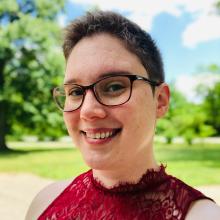Member Spotlight: Amy Loviska
Doctoral Candidate, Department of Human Development and Family Science, Purdue University; Member of the SRCD SOGIE Caucus
Why did you decide to choose developmental science as a course of study or career?
Throughout my educational and professional career, I have worked in many diverse areas of psychology, but the development-focused projects always drew more of my attention and interest. The projects that explored the impacts of pubertal development solidified my interest in working with adolescents as well as my desire to understand how early life experiences impact later life outcomes.
Is there a mentor or mentors who have been instrumental to your studies and career path so far, and, if so, who and how?
Working as a lab coordinator for Dr. Adriene Beltz prior to graduate school solidified my desire to pursue developmental research as a career and allowed me to build and practice foundational research skills that have made me successful during my graduate training. My graduate advisors Drs. Kristine Marceau and Valerie Knopik have been immensely supportive in both my personal and professional life, from their quick correction of any misgendering toward me to providing me the academic freedom to pursue my research interests that go beyond their research focus. Drs Marceau and Knopik are always willing to learn and grow alongside me and I attribute much of my success to their support and guidance.
What advice would you give to a prospective graduate student thinking about beginning their Ph.D. studies in the developmental science field?
Choose programs and mentors because they will be supportive of your career goals and personal life, not because they are prestigious. Consider the program's departmental culture as well as your potential mentor's philosophy on mentoring/advising and ensure it matches your wants and needs. Graduate training is hard, but the burden is lightened when you are in an environment that is primed to let you flourish.
What is your best SRCD memory?
I had my first ever conference presentation at the SRCD 2023 Biennial Meeting in Salt Lake City, Utah. The audience was so engaging and enthusiastic about my research project. I couldn't have asked for a better environment to make my conference presentation debut.
Why did you join the SOGIE Caucus and how does it facilitate connection among members all year long?
During my undergraduate training, I often felt my experience as a transgender, non-binary, and bisexual individual was not represented in the theories I was learning nor the research I was reading. I joined the SOGIE caucus to support and promote research so that future LGBTQ+ undergraduates wouldn't feel the same disconnection and under-representation in their training materials that I did. Being queer, I also understand the importance of community and wanted a way to connect with other academics who shared and/or supported my identities. The SOGIE caucus facilitates such community building through communication via their listserv as well as developing programming that keeps members connected. The SOGIE SRCD panel during SRA is an example of bringing this community together even when SRCD isn't convening, and I truly value those off-time meeting opportunities.
